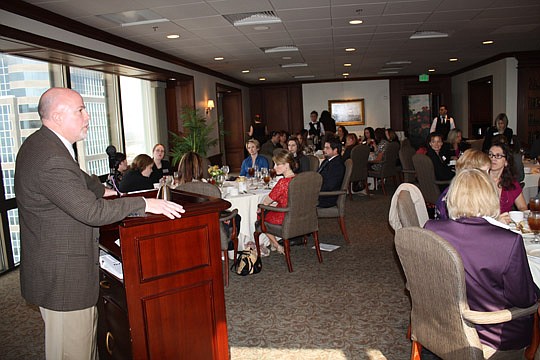
The new leader of Jacksonville Area Legal Aid explained last week how overcoming a $678,000 budget deficit would not only help Jacksonville's poor, but also its business community.
Jim Kowalski was named executive director of Jacksonville Area Legal Aid, commonly referred to as JALA, in late November. The organization provides civil legal services to those who cannot afford it.
"JALA's advocates handle cases for thousands of clients each year. From family law cases for domestic violence victims to immigration, to cases for deaf clients, to fair housing, to the extraordinarily innovative work that our predatory lending unit has done in the areas of foreclosure and collection defense," Kowalski told members of the Jacksonville Women Lawyers Association as their keynote speaker.
He stressed a need in Jacksonville for a five- and 10-year plan for developing a community its residents want to see and discussed how legal aid is a part of that vision.
Kowalski said legal aid's work assist clients and the business community by solving employees' problems, which helps them return to their jobs, he said.
Due to funding struggles, legal aid work and ongoing results have become harder to accomplish.
He asked the association's members what kind of community they wanted to live in and explained how legal aid contributes to that vision.
"JALA's work raises the floor and makes our communities better, and yet the funding model is broken. JALA received over a million dollars from The Florida Bar Foundation (Interest on Trust Account) funding just a few years ago. This year its $311,000," said Kowalski.
He said at a budget meeting his first day, he was handed a budget with a $678,000 hole for fiscal 2013.
A possible funding source Kowalski is pursuing is the state-federal foreclosure settlement attained by Florida Attorney General Pam Bondi. It provides an estimated $8.4 billion in relief to Florida homeowners and addresses future mortgage loan-servicing practices.
"All of the major changes that we have been able to force on the banks and servicers in this country have come from the work done by legal aid lawyers and similarly situated advocates," he said.
The work and results have not come from law enforcement, but from legal aid lawyers, he said.
Despite progress, legal aid organizations have yet to see any settlement funding, Kowalski said.
Another revenue source idea was a 2010 ordinance passed by City Council and introduced by attorney and former Council member Kevin Hyde. The ordinance established a $50 court cost fee charged to people who commit felonies, misdemeanors and criminal traffic infractions. It is scheduled to sunset Dec. 31, 2014.
According to Kowalski, legal aid has yet to receive any funding from that fee.
"It was an idea to create funding for legal aid, but it's not
working. It's charging fees to people legal aid is trying to help. We need to find another source of funding," said Hyde.
That source can be found in the business community, Kowalski explained. He has begun to educate the public about how legal aid contributes to a productive community and creating change.
He used the example of Copenhagen, Denmark, to illustrate how it changed its community vision by building bike lanes to encourage people to ride bicycles to work and reduce carbon emissions.
"Destination cities like Copenhagen are diverse and active, have enormous support for legal services, especially for the working poor, because they understand that is important for the community and how you want to be as a community," said Kowalski, who is a cyclist.
@photojoe71
(904) 356-2466